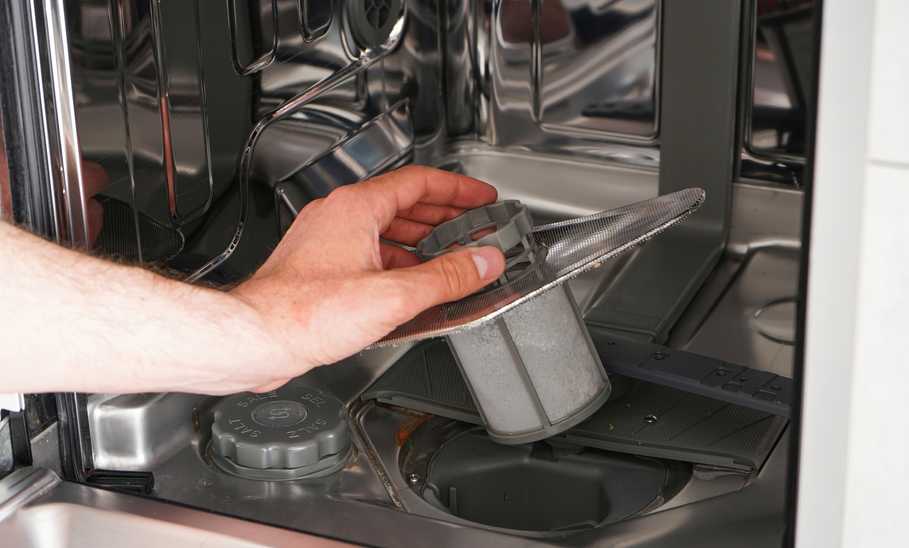How to Clean a Dishwasher for Sparkling Results Every Time

Our evaluations and opinions are not influenced by our advertising relationships, but we may earn a commission from our partners’ links. This content is created by TIME Stamped, under TIME’s direction and produced in accordance with TIME’s editorial guidelines and overseen by TIME’s editorial staff. Learn more about it.
Our kitchens are home to many appliances, but for most of us, the dishwasher is the most important. Washing dishes by hand is cumbersome, draining, and, let’s face it, boring. A dishwasher does most of the work for you by washing and drying dishes, pots, pans, silverware, and more. But what happens when the machine that washes your dishes needs a wash, too? Knowing how to clean your dishwasher is important so you can continue to get sparkling results every time you run the machine. In this article, we’ll walk you through the necessary steps on how to clean a dishwasher, addressing such issues as mold, mildew, and other frequently encountered problems.
To clean your dishwasher properly, you will need gloves, a small scrubbing brush, a sponge, a microfiber cleaning cloth, and a dishwasher-safe bowl. To do the actual cleaning, you can use diluted dish soap, vinegar, and baking soda. If you have a stainless steel dishwasher, you’ll want to use an appropriate cleaner to wipe down the outer surface.
Remove the bottom rack and remove any food particles. Then, clean the bottom of the dishwasher with diluted dish soap and a sponge. If you find a lot of food particles, this means you’re not scraping off your plates properly before placing them in the dishwasher. Doing so can help keep your machine running smoothly by minimizing the debris left behind.
For hard, stuck-on debris, Schulz suggests the following. “Mix a tablespoon of baking soda with water to make a thin paste. Use a microfiber cloth or non-abrasive sponge to apply the paste and let it sit for a few minutes. Then use the cloth or sponge to gently scrub the residue or food off. Rinse with a damp cloth.”
Consult your owner’s manual to locate the dishwasher’s filter. Remove it, and clean away debris. Rinse the filter in hot water and place it back inside the dishwasher. A clogged filter can cause unwanted smells and can harbor bacteria.
Using a damp cloth and a cleaning agent like diluted dish soap, wipe down your dishwasher’s seals. Mold and mildew grow in these cracks and crevices, so be thorough.
Clogged water ducts prevent water from reaching dirty dishes. Wipe down the spray arms with a cloth, then use a bristle brush to scrub and remove any debris.
Replace the bottom rack. Fill a dishwasher-safe bowl with one cup of vinegar, place it on the top rack, and run it on a quick hot cycle.
Open the dishwasher and wipe everything down with a fresh, dry cloth. Keep the dishwasher open so it can air dry.
Generally, a dishwasher should be cleaned on a daily, weekly, and monthly basis in varying degrees of thoroughness, according to Toby Schulz, CEO and co-founder of Maid2Match. After daily use, you should rinse the filter and remove any visible food debris.
Weekly, you can use a disinfecting spray to clean the door, gaskets, and surfaces with some vinegar to prevent mold. “You can also wash the filter if it’s looking dingy. Spray down the exterior as well, or just wipe with a clean, damp cloth to get rid of any spots and residue,” says Schulz.
Once a month, you should deep clean your dishwasher by running the cleaning cycle or manually cleaning the drains, filters, and surfaces with bleach or vinegar.
Just because your dishwasher uses water and soap does not mean it’s a self-cleaning machine. “Over time, soap scum accumulates on the walls, and food particles can get trapped in the drain, breeding bacteria and potentially damaging the machine,” says Ron Shimek, CEO of Mr. Appliance. “Additionally, grease from fatty foods often isn't fully removed by soap alone.”
Built-up mold, mildew, and even minerals from hard water can damage your dishwasher. Cleaning it regularly is essential for optimal results, but it also extends the life of your machine.
According to Shimek, there are three main signs that your dishwasher needs to be cleaned:
Even if just one of these problems is plaguing your dishwasher, it means it’s time for a clean.
A dirty dishwasher is a smelly dishwasher. The main culprit is usually the filter. Take it out and clean it well. Food and debris collect in filters, and the longer they stay in there, the more smelly they become. The second most likely culprit is mold and mildew. Be sure to wipe down the dishwasher seals. Remember, mold and mildew love dark, moist areas, and your dishwasher is the perfect place for them.
To clean a moldy dishwasher, use the vinegar cleaning method mentioned above. Once done, sprinkle baking soda at the bottom of the dishwasher and run another hot water cycle. Thoroughly dry out the inside of your dishwasher, paying special attention to the seals. Then leave it open to air dry.
Cheap detergents can cause build-up and leave residue, leaving dishes less than clean.
Run an empty cycle once in a while to flush out grease and build-up.
Clean out debris and food particles from the filter every week. Buildup can cause unwelcome smells and prevent your dishes from getting completely clean.
“Vinegar is an excellent cleaning agent for removing stains, odors, and polishing stainless steel. It's safe to use on most machines,” adds Eva Lorena, commercial kitchen consultant at Zanduco.
According to the National Institute of Health, vinegar’s acidic nature is strong enough to kill bacteria and dissolve limescale, grease, dirt, and other buildup. It’s also cost-effective, and a little goes a long way.
Vinegar and baking soda should be used separately.
“While vinegar and baking soda are both effective cleaners, I wouldn't recommend combining them when cleaning your dishwasher,” says Lorena. “While it's safe and will create those satisfying bubbles, vinegar and baking soda will cancel each other out due to their chemical makeup, creating what is essentially salt water.”
Bleach is great for disinfecting, but it may be too harsh on your dishwasher.
“As much as possible, avoid using bleach or bleach-based products when cleaning the dishwasher. The bleach can degrade the interior mechanisms, especially anything made of stainless steel,” says Schulz.
The information presented here is created by TIME Stamped and overseen by TIME editorial staff. To learn more, see our About Us page.



